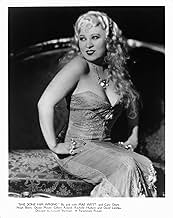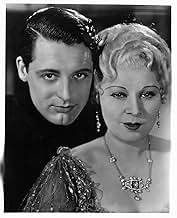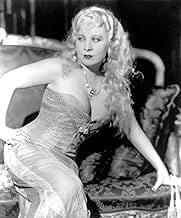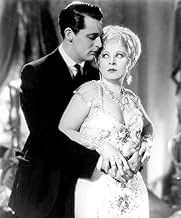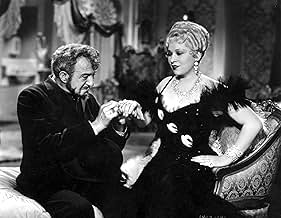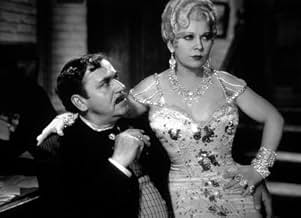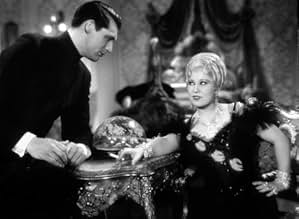IMDb RATING
6.3/10
7.4K
YOUR RATING
In the Gay Nineties, a seductive nightclub singer contends with several suitors, including a jealous escaped convict and a handsome temperance league member.In the Gay Nineties, a seductive nightclub singer contends with several suitors, including a jealous escaped convict and a handsome temperance league member.In the Gay Nineties, a seductive nightclub singer contends with several suitors, including a jealous escaped convict and a handsome temperance league member.
- Nominated for 1 Oscar
- 5 wins & 1 nomination total
Noah Beery
- Gus Jordan
- (as Noah Beery Sr.)
Robert Homans
- Doheney
- (as Robert E. Homans)
Ernie Adams
- Man in Audience
- (uncredited)
Billy Bletcher
- Singing Waiter
- (uncredited)
Wade Boteler
- Dan's Pal
- (uncredited)
Jack Carr
- Patron Who Hits His Girl
- (uncredited)
- Director
- Writers
- All cast & crew
- Production, box office & more at IMDbPro
Featured reviews
Mae West was a veteran of burlesque, vaudeville and the Broadway stage by the time she made her first film in 1932 at the age of 39. `She Done Him Wrong' was her second film and her first starring role in an adaptation of her smash Broadway hit `Diamond Lil'. It was a play that West had written herself and it played to packed houses on Broadway for years. This film was nominated for an Academy Award for best picture and made Cary Grant into an instant star. Mae went on to write nine of the fourteen screenplays for films in which she was to star. Thus, all those great quotes we've heard that are attributed to her were not only said by her, but written by her as well. By 1935, she was the most highly paid woman in America. To this day, she remains one of the female stars most often imitated by female impersonators.
This film is among her best. It is full of the bawdy double entendre that became her trademark. She was the queen of sexual innuendo and suggestive dialogue and many of her lines have become part of Americana (e.g. `Is that a gun in your pocket or are you just glad to see me?' And, `A hard man is good to find.' And of course, `Come up and see me sometime.')
The plot of this film is simplistic and it is clearly a vehicle for her enormous talent, leading up to the now famous proposal by Cary Grant at the end of the film. Mae commands every frame of the film with her incomparable combination of sex appeal and ribald humor. Her sense of comic timing is impeccable making the funny lines she writes that much more hilarious by the snide way in which she delivers them.
Before this film, Cary Grant had appeared in half a dozen films and was building a reputation as a solid actor. However, none of his early films gave him the exposure that this film did due to its wild popularity at the time. West handpicked him for the part saying that he combined virility with the bearing of a gentleman. She wanted someone who would epitomize the now famous line, `Hello, warm, dark and handsome.' Though his role in this film is minor compared to West's, it made him a household name and a bankable star.
This classic film is a piece of film history that shouldn't be missed. I rated it a 10/10. It is among Mae West's best moments. I highly recommend it.
This film is among her best. It is full of the bawdy double entendre that became her trademark. She was the queen of sexual innuendo and suggestive dialogue and many of her lines have become part of Americana (e.g. `Is that a gun in your pocket or are you just glad to see me?' And, `A hard man is good to find.' And of course, `Come up and see me sometime.')
The plot of this film is simplistic and it is clearly a vehicle for her enormous talent, leading up to the now famous proposal by Cary Grant at the end of the film. Mae commands every frame of the film with her incomparable combination of sex appeal and ribald humor. Her sense of comic timing is impeccable making the funny lines she writes that much more hilarious by the snide way in which she delivers them.
Before this film, Cary Grant had appeared in half a dozen films and was building a reputation as a solid actor. However, none of his early films gave him the exposure that this film did due to its wild popularity at the time. West handpicked him for the part saying that he combined virility with the bearing of a gentleman. She wanted someone who would epitomize the now famous line, `Hello, warm, dark and handsome.' Though his role in this film is minor compared to West's, it made him a household name and a bankable star.
This classic film is a piece of film history that shouldn't be missed. I rated it a 10/10. It is among Mae West's best moments. I highly recommend it.
Mae West is certainly entertaining with her wisecracks and sexual innuendo. Unfortunately, she's the only entertaining thing about this whole film. The other actors, even a young Cary Grant, aren't given terribly interesting characters to inhabit. The whole thing is set-bound and the story is nonsense.
Okay, maybe not nonsense, but it is cluttered with too many subplots and one-note characters which fail to hold interest. The first ten minutes are a pain to sit through, mainly because West isn't there to enliven the proceedings. That should not be.
She Done Him Wrong (1933) is an interesting curio and a showcase for Mae West, but as entertainment, it is lacking.
Okay, maybe not nonsense, but it is cluttered with too many subplots and one-note characters which fail to hold interest. The first ten minutes are a pain to sit through, mainly because West isn't there to enliven the proceedings. That should not be.
She Done Him Wrong (1933) is an interesting curio and a showcase for Mae West, but as entertainment, it is lacking.
After a supporting role in the George Raft film Night After Night, Paramount films realized what a gold mine they had in Mae West. Between her and a young radio singer named Bing Crosby, they pulled Paramount from the brink of bankruptcy, the white mountain studio nearly went under in the early Thirties.
After this the studio gave Mae her head in choosing material and she decided to use one of her own original plays, She Done Him Wrong. The story is set in the Bowery district of the 1890s and New York of the 1890s is where Mae grew up, she had a good ear and a good memory for character types she uses in the film.
Mae always plays Mae West and would you really want her as anyone else? She's a Bowery entertainer of the period, working in this case for Noah Beery's club as the main attraction. Beery's into some really shady business, he doubles in white slavery and nearly gets innocent Rochelle Hudson who tries to kill herself in his club. Mae saves her, but turns her over to Beery because she doesn't know about his other sideline. All she knows is that he pays off in diamonds as well as cash.
Besides Beery panting after her, we've got silent screen star Owen Moore, young Gilbert Roland who is the assistant to white slaver Rafaela Ottiana and in the film that would be his breakthrough, Cary Grant as a Salvation Army worker who's not all he seems. Mae personally picked Grant for his role, he was a young Paramount contract player beginning to get some notice. But as I said before in my review of I'm No Angel, this is not a Cary Grant film, this is a Mae West film.
Mae besides being one of the great sex symbols of the last century had a great memory and eye for detail of the bawdy Bowery of her youth. Good thing she came along before The Code was put in place. Her first films are her best, The Code definitely hampered her style.
And Mae West if she had anything, had style.
After this the studio gave Mae her head in choosing material and she decided to use one of her own original plays, She Done Him Wrong. The story is set in the Bowery district of the 1890s and New York of the 1890s is where Mae grew up, she had a good ear and a good memory for character types she uses in the film.
Mae always plays Mae West and would you really want her as anyone else? She's a Bowery entertainer of the period, working in this case for Noah Beery's club as the main attraction. Beery's into some really shady business, he doubles in white slavery and nearly gets innocent Rochelle Hudson who tries to kill herself in his club. Mae saves her, but turns her over to Beery because she doesn't know about his other sideline. All she knows is that he pays off in diamonds as well as cash.
Besides Beery panting after her, we've got silent screen star Owen Moore, young Gilbert Roland who is the assistant to white slaver Rafaela Ottiana and in the film that would be his breakthrough, Cary Grant as a Salvation Army worker who's not all he seems. Mae personally picked Grant for his role, he was a young Paramount contract player beginning to get some notice. But as I said before in my review of I'm No Angel, this is not a Cary Grant film, this is a Mae West film.
Mae besides being one of the great sex symbols of the last century had a great memory and eye for detail of the bawdy Bowery of her youth. Good thing she came along before The Code was put in place. Her first films are her best, The Code definitely hampered her style.
And Mae West if she had anything, had style.
Set mostly in a bawdy saloon/dance hall in NYC during the 1890s, this film is a showcase for the talents of Mae West. She plays Lady Lou, a self-confident, sassy singer with a quick wit, who entertains customers with songs that have a Blues theme and were popular in vaudeville.
In this role, buxom Mae West is at her best. She struts her stuff, she wears tons of diamonds, she smiles in a slightly mischievous way, she rolls her eyes, and she speaks in a voice that is more than a little nasal. Her costumes are glamorous and flamboyant. In short, she presents an on-screen image that is wonderfully ... unique.
The film's story is thin and largely irrelevant. It involves the people around Lady Lou, some of whom are schemers and cheats. Implicit sexual references in the dialogue, and the character of Lady Lou, led the "National Legion of Decency" to push down our throats the Production Code, a wretched policy device that censored cinematic content for some thirty years thereafter.
If I have a complaint with this film it is that the story is too serious. Mae West is placed in scenes that allow her merely to recite dialogue. She is less an actress than a singer and on-stage performer. I would have preferred a more lighthearted musical theme, to play up her musical talents.
And so for me, the best parts of this film are the musical numbers few though they may be. Mae West sings "Frankie And Johnny" and a couple of other songs. One of my favorite sequences occurs about midway through the film. In what appears to be an authentically designed music hall set, an Irish tenor with a big mustache sings "Silver Threads Among The Gold", a musical tearjerker popular with barbershop quartets of that era. The song's sad theme prompts a man in the audience literally to "cry in his beer". Gas lights point upward to the stage. And behind the singing tenor, a curtain sways back and forth, with product signs that read "Old Whiskey", "Dijon Burgundy", among others. It's a sequence that is straight out of vaudeville. Marvelous!
"She Done Him Wrong" is a film whose story almost gets in the way of the main character, played by a legendary talent. The film is worth watching more than once, but only to see marvelous Mae West, and to listen to those wonderful songs from the bygone days of vaudeville.
In this role, buxom Mae West is at her best. She struts her stuff, she wears tons of diamonds, she smiles in a slightly mischievous way, she rolls her eyes, and she speaks in a voice that is more than a little nasal. Her costumes are glamorous and flamboyant. In short, she presents an on-screen image that is wonderfully ... unique.
The film's story is thin and largely irrelevant. It involves the people around Lady Lou, some of whom are schemers and cheats. Implicit sexual references in the dialogue, and the character of Lady Lou, led the "National Legion of Decency" to push down our throats the Production Code, a wretched policy device that censored cinematic content for some thirty years thereafter.
If I have a complaint with this film it is that the story is too serious. Mae West is placed in scenes that allow her merely to recite dialogue. She is less an actress than a singer and on-stage performer. I would have preferred a more lighthearted musical theme, to play up her musical talents.
And so for me, the best parts of this film are the musical numbers few though they may be. Mae West sings "Frankie And Johnny" and a couple of other songs. One of my favorite sequences occurs about midway through the film. In what appears to be an authentically designed music hall set, an Irish tenor with a big mustache sings "Silver Threads Among The Gold", a musical tearjerker popular with barbershop quartets of that era. The song's sad theme prompts a man in the audience literally to "cry in his beer". Gas lights point upward to the stage. And behind the singing tenor, a curtain sways back and forth, with product signs that read "Old Whiskey", "Dijon Burgundy", among others. It's a sequence that is straight out of vaudeville. Marvelous!
"She Done Him Wrong" is a film whose story almost gets in the way of the main character, played by a legendary talent. The film is worth watching more than once, but only to see marvelous Mae West, and to listen to those wonderful songs from the bygone days of vaudeville.
Mae West had a Broadway smash when she penned the bawdy tale of DIAMOND LIL for herself--and with a few tweaks here and there the story came to the screen as SHE DONE HIM WRONG. The film was an immediate hit and the role of Lady Lou remains one of West's best remembered performances. The script is jam-packed with some of West's most famous lines, including the memorable "Come up'n see me sometime. I'm home every evenin'" and "You can be had." West throws her lines with style, aplomb, enough innuendo to make a censor cringe, and considerable humor--but, somewhat surprisingly, the movie is not really a comedy.
SHE DONE HIM WRONG is a hard-knocks tale of Bowery bruisers who dance attendance upon the 'Lady Lou' and often resort to crime to keep her dripping in the diamonds she prizes above all else. But although she has one lover already locked up in jail, another one mixed up in the white slavery rackets, and still a third waiting to step into the gap, the Lady Lou is more interested in seducing missionary Cary Grant... only to find him less interested in her body than her soul, a circumstance that prompts West to utter one of the most how-did-that-get-past-the-censors lines in 1930s cinema: "Maybe I ain't got no soul." This is a surprisingly tough little movie, and in addition to West's zinging lines and occasional musical numbers SHE DONE HIM WRONG also offers a glimpse at a very young (and still slightly wooden) Cary Grant; it also has an ensemble cast that plays in a very enjoyable grand manner, truly first rate production values all the way, and A surprisingly brisk running time. West did funnier films than this, but the mix of her sharp wit and the rough story is particularly memorable. This is where the fire started really started, and I recommend it very strongly.
Gary F. Taylor, aka GFT, Amazon Reviewer
SHE DONE HIM WRONG is a hard-knocks tale of Bowery bruisers who dance attendance upon the 'Lady Lou' and often resort to crime to keep her dripping in the diamonds she prizes above all else. But although she has one lover already locked up in jail, another one mixed up in the white slavery rackets, and still a third waiting to step into the gap, the Lady Lou is more interested in seducing missionary Cary Grant... only to find him less interested in her body than her soul, a circumstance that prompts West to utter one of the most how-did-that-get-past-the-censors lines in 1930s cinema: "Maybe I ain't got no soul." This is a surprisingly tough little movie, and in addition to West's zinging lines and occasional musical numbers SHE DONE HIM WRONG also offers a glimpse at a very young (and still slightly wooden) Cary Grant; it also has an ensemble cast that plays in a very enjoyable grand manner, truly first rate production values all the way, and A surprisingly brisk running time. West did funnier films than this, but the mix of her sharp wit and the rough story is particularly memorable. This is where the fire started really started, and I recommend it very strongly.
Gary F. Taylor, aka GFT, Amazon Reviewer
Did you know
- GoofsShadow of camera moves against the back wall of Lady Lou's apartment while she and Sally are talking.
- Alternate versionsMaryland, Massachusetts, New York, Ohio, and Pennsylvania removed the song "A Guy What Takes His Time". Will H. Hays and Adolph Zukor went to New York to edit the song to an entrance by Mae West, one opening verse, and one closing verse to lessen the suggestiveness. Despite this, Ohio and Pennsylvania cut all of West's one liners.
- ConnectionsFeatured in The Twentieth Century: The Movies Learn to Talk (1959)
- How long is She Done Him Wrong?Powered by Alexa
Details
Box office
- Budget
- $200,000 (estimated)
- Runtime1 hour 6 minutes
- Color
- Aspect ratio
- 1.37 : 1
Contribute to this page
Suggest an edit or add missing content



